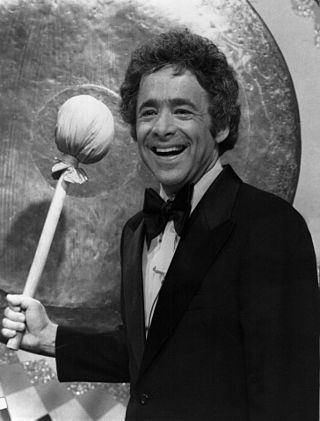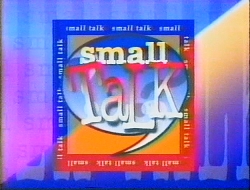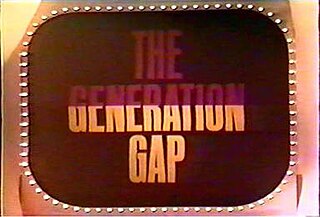
Match Game is an American television panel game show that premiered on NBC in 1962 and has been revived several times over the course of the last six decades. The game features contestants trying to match answers given by celebrity panelists to fill-in-the-blank questions. Beginning with the CBS run of the 1970s, the questions are often formed as humorous double entendres.

Family Feud is an American television game show created by Mark Goodson. It features two families who compete to name the most popular answers to survey questions in order to win cash and prizes.

Charles Hirsch Barris was an American game show creator, producer, and host. Barris was known for hosting The Gong Show and creating The Dating Game and The Newlywed Game. He was also a songwriter who wrote "Palisades Park", recorded by Freddy Cannon and also recorded by Ramones. Barris wrote an autobiography titled Confessions of a Dangerous Mind, which was made into the film of the same title starring Sam Rockwell and directed by George Clooney.

Card Sharks is an American television game show. It was created by Chester Feldman for Mark Goodson-Bill Todman Productions. The game features two contestants who attempt to predict the outcome of survey questions to gain control of a row of oversized playing cards, then determine whether the next card drawn is higher or lower. The title Card Sharks is a play on the term "card sharp", a person skilled at card games.

The Newlywed Game is an American television game show that puts newly married couples against each other in a series of revealing question rounds to determine how well the spouses know or do not know each other. The program, originally created by Robert "Nick" Nicholson and E. Roger Muir and produced by Chuck Barris, has appeared in many different versions since its 1966 debut. The show became famous for some of the arguments that couples had over incorrect answers in the form of mistaken predictions, and it even led to some divorces.
The Joker's Wild is an American television game show that aired at different times between 1972 and 2019. In the show, contestants answer questions based on categories determined randomly by a mechanism resembling a slot machine. The show's title refers to the game's slot-machine mechanism also having jokers.

Twenty-One is an American game show originally hosted by Jack Barry that initially aired on NBC from 1956 to 1958. Produced by Jack Barry-Dan Enright Productions, two contestants competed against each other in separate isolation booths, answering general-knowledge questions to earn 21 total points. The program became notorious when it was found to be rigged as part of the 1950s quiz show scandals, which nearly caused the demise of the entire genre in the wake of United States Senate investigations. The 1994 film Quiz Show is based on these events. A new version of the show aired on NBC in 2000 with Maury Povich as host.

Dream House is an American game show that saw contestants competing to win, as the title of the show indicates, a new house. The show originally premiered in primetime on ABC on March 27, 1968, with a daytime edition premiering on April 1, 1968. The primetime series aired weekly until September 19, 1968, and the daytime series aired daily until January 2, 1970, when it was replaced with All My Children. The daytime series was revived for NBC's daytime schedule and premiered on April 4, 1983, running until June 29, 1984.
Fandango is a country music-themed quiz show which aired on The Nashville Network from March 8, 1983 to August 26, 1988, with reruns airing through March 31, 1989, when it was replaced by Top Card. Fandango was the first TV game show to air on TNN and was one of the longest-running game shows on a cable network.

Small Talk is an American game show hosted by comedian Wil Shriner and produced by Reg Grundy Productions that aired on The Family Channel from September 30, 1996, to January 3, 1997. Reruns continued until January 17. The series aired as part of an original game show block, alongside The New Shop 'Til You Drop, Shopping Spree, Wait 'til You Have Kids, and The New Family Challenge.

Mindreaders is an American game show produced by Goodson-Todman Productions which aired on NBC from August 13, 1979, through January 11, 1980. Although NBC originally agreed to a 26-week run, the network canceled Mindreaders after 22 weeks. The host was Dick Martin and the announcer was Johnny Olson, with Jack Narz subbing. The program was taped at Studio 4 at NBC in Burbank, California.
Three's a Crowd is an American game show originally packaged by Chuck Barris Productions. The first version aired in syndication from September 17, 1979, to February 1, 1980. The second version ran in 1999 on Game Show Network.
The Parent Game is an American game show that ran in syndication from 1972–1973. The show was hosted by Clark Race, a Los Angeles radio personality, with Johnny Jacobs as the announcer. The answers were commented by child psychologist Dorothy Thompson, who did not appear in-studio.
WinTuition is an American game show created as an original series for Game Show Network, on which it originally ran from December 9, 2002 to April 1, 2003, with repeats until January 4, 2004. The game had a school-oriented theme in which three contestants competed to answer questions on general school-based subjects in an attempt to win a $50,000 college fund, hence the name of the show. The show was hosted by Marc Summers and announced by Burton Richardson. Henry Winkler served as the show's executive producer. WinTuition would end up being the final game show that Summers would emcee.

Kidstreet is a Canadian children's game show that aired from 1987 to 1992 and was hosted by Kevin Frank, with Kathy Morse as the announcer, who also worked as associate producer.

Family Challenge is an American game show that aired on The Family Channel from October 2, 1995 to September 7, 1997, lasting for two seasons. Reruns aired on Game Show Network from April 3 to September 25, 1999.
Second Honeymoon is a Canadian game show that was hosted by Wayne Cox. Wink Martindale created and produced the show with his then-business partner Jerry Gilden, and radio personality Doc Harris was the announcer.
Family Secrets is a daytime game show, running on NBC from March 22 to June 11, 1993. Bob Eubanks hosted and Orlando-area disc jockey Dean Miuccio announced. The show was taped at the Disney-MGM Studios in Orlando, Florida in front of a live studio audience consisting of theme park guests. It would turn out to be the final game show that Eubanks would host.

The Generation Gap is a primetime American game show that aired from February 7 to May 23, 1969, on ABC. It was originally hosted by Dennis Wholey, who was replaced by Jack Barry after ten episodes had aired. Fred Foy announced during the entire run.
Love Handles was a Canadian television game show produced by Blair Murdoch from 1996 to 1998 on the Global Television Network, and hosted by Stu Jeffries. The show's announcer was David Kaye.











